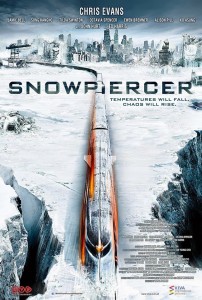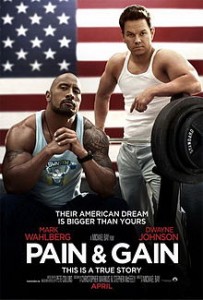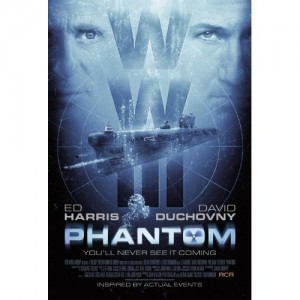Snowpiercer
Posted on July 1, 2014 at 6:00 pm
 A French graphic novel by Jacques Lob
A French graphic novel by Jacques Lob about a post-apocalyptic train containing all that is left of humanity is now the first English-language film from Korean director Joon-ho Bong (“Mother,” “The Host”), with an international cast that includes Chris Evans, Jamie Bell, Ed Harris, and Tilda Swinton. It is a visually stunning and intellectually ambitious allegory with all of its action and sci-fi imagination in service of provocative commentary.
In an effort to mitigate the damage from climate change, people all over the world shot a chemical into the air that precipitated an overcorrection so extreme that the entire world is covered with snow and ice and is not longer habitable for humans. Seventeen years earlier, the few remaining people were allowed to board a train designed by Mr. Wilford, who still lives in the train’s first car and keeps its engine running. He is considered something like a king or even a god by the train’s passengers, some of whom are 17 or younger and have never known any life off the train.
The train circles the globe once a year, and measures the passage of time by the landmarks it passes. After a brief prologue with snippets of news reports informing us of the environmental catastrophe, we meet the poor, filthy, brutally abused inhabitants of the train’s last car, including Curtis (Chris Evans, almost unrecognizable in a black knit cap and with a haunted expression) and his best friend Edgar (Jamie Bell). They are kept barely alive through doling out of icky looking “protein bars.” And they are kept in control by masked, brutal guards armed with assault weapons. There have been brief attempts at rebellion or escape but all have failed.
Occasionally they are visited by someone from one of the forward cars. Mason (Tilda Swinton, brilliant as a demented apparatchik) has the most terrifying smile of chipper malice since Imelda Staunton as Dolores Umbridge. And there is another woman who appears from time to time to measure the children in the last car and take some of them away with no explanation. They are never seen again. Curtis reveres Gilliam (John Hurt), a disabled old man who encourages Curtis and Edgar to start a real revolution. But one lesson they have learned from the failed attempts is that it cannot work unless they get all the way to the front car and gain control of the engine. That means they will need to break out of the train’s prison the only man who can unlock the doors between the train cars.
The rebels move forward, at devastating cost, surging through a series of train cars, each with stunning revelations about what has become of human society. But nothing can prepare them for the shocks of the final confrontation in the engine car.
If Jonathan Swift was a filmmaker, this would be the movie he’d make — sharp, compelling, challenging. As Curtis crosses doorway after doorway, each opens into another remarkable tableau, a beauty salon, a fish farm, a classroom, a disco. This is a story that is richly imagined and powerfully presented.
Parents should know that this film has apocalyptic themes and images, constant peril and violence with a variety of weapons, disturbing images, many characters injured and killed, constant very strong language, smoking, and drugs and drug addiction.
Family discussion: What elements of the society on the train are similar to cultures in the world today? Does Wilford make good points about what it takes to sustain a community? How does this story explore the way that myths and traditions are developed? What do you think will happen next?
If you like this, try: “Brazil” and “In Time”


